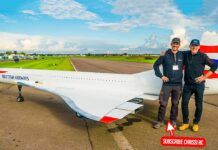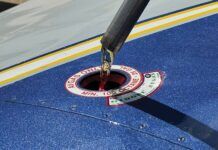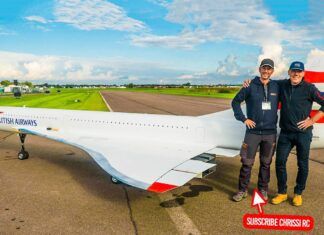 Aircraft owners can still explore the wonders of Maine without being taxed on their airplane but they do have to follow the rules, according to a senior Maine tax official. David Bauer, of Maines Bureau of Revenue Services, told AVweb his department and other government offices have received “huge volumes of e-mail and phone calls” since AVweb carried the story about Massachusetts resident Steve Kahns battle with Maine over its “User Tax.” Bauer said the story left the incorrect impression that any visit by an out-of-state aircraft would trigger the tax. “The bottom line is that you should plan carefully if you intend to fly into Maine, and spend more than 20 days in Maine, within one year after the initial purchase of your aircraft and you have not paid a sales or use tax on the aircraft in another state,” Bauer said.
Aircraft owners can still explore the wonders of Maine without being taxed on their airplane but they do have to follow the rules, according to a senior Maine tax official. David Bauer, of Maines Bureau of Revenue Services, told AVweb his department and other government offices have received “huge volumes of e-mail and phone calls” since AVweb carried the story about Massachusetts resident Steve Kahns battle with Maine over its “User Tax.” Bauer said the story left the incorrect impression that any visit by an out-of-state aircraft would trigger the tax. “The bottom line is that you should plan carefully if you intend to fly into Maine, and spend more than 20 days in Maine, within one year after the initial purchase of your aircraft and you have not paid a sales or use tax on the aircraft in another state,” Bauer said.
Theres nothing new about Maines use tax and it also applies to other items of “tangible personal property” like boats (with a 30-day grace period) and, in certain circumstances, cars. Aircraft are perhaps easier to track than other items because most flights leave an FAA paper trail. However, the tax does not apply to any item purchased more than a year before its entry to Maine. Theres also an exemption for aircraft undergoing “necessary” repairs or maintenance (paint and interior work dont count, for the most part). But Bauer said the vast majority of aircraft owners need not fear the tax. “In most situations, nonresidents flying into Maine do not owe the tax and are not at risk of being assessed,” he said. “There are circumstances where a tax will be due, but that is the exception, not the rule.” Bauer has promised to enlighten us on Maines justification for the tax next week.
Use Tax on Aircraft
| A. | Law Prior to January 1, 2007 |
| | 1. | Use Tax Due | | Prior to January 1, 2007, Maine tax law imposed a use tax on any aircraft on which the owner had not paid equivalent sales tax to another state and that was not purchased and used for more than 12 months before it became physically present in Maine. See 36 MRSA 1760(45). Example:
Corporation X purchased an aircraft in Delaware on January 1, 2003 and did not pay sales tax on the airplane to Delaware or any other state. If the aircraft becomes physically present in Maine prior to January 1, 2004, Maine use tax is due on that aircraft. Note: By “present in Maine,” we mean more than a de minimis usage; MRS has never assessed a use tax on a plane that was flown into Maine just once or twice, or even a handful of times, during the year.
| | 2. | What Sort of Physical Presence Is Necessary? | | Maine Revenue Services’ position has always been that mere entry of an aircraft into Maine airspace does not constitute sufficient presence to trigger use tax. A ground presence, however, of more than a de minimis level, did technically give rise to a use tax liability under pre-2007 law, regardless of the reason for that presence or the duration of the aircraft’s stay in Maine. For safety considerations, MRS practice was not to assess use tax against an aircraft that was periodically present in Maine solely for repair purposes. MRS, however, did not develop a formal policy to distinguish mechanically necessary repairs from discretionary maintenance and aesthetic work, like periodic reconditioning. | | 3. | If the Aircraft Was Merely Stored Outside Maine for 12 or More Months, Could It Enter Maine without Potential Use Tax Liability? | | No. The last sentence of 36 MRSA 1760(45), as in effect prior to January 2007, makes it clear that the plane must be used “for a purpose consistent with its design” and not just stored. |
|
| B. | Law as of January 1, 2007 |
| The 122nd Legislature amended 36 MRSA 1760 in two important ways to change the use tax treatment of aircraft. |
| | 1. | Large Aircraft and Turbine-Powered Aircraft | | The Legislature added a new sales/use tax exemption in subparagraph 88, as follows: 88. Aircraft.
Sales or leases of aircraft that weigh over 6,000 pounds, that are propelled by one or more turbine engines or that are in use by a Federal Aviation Administration classified 135 operator.
Accordingly, all aircraft meeting this definitional requirement are exempt from Maine use tax regardless of when they enter Maine as long as there was no taxable presence of the aircraft in Maine prior to January 1, 2007. Note: exempt turbine-powered aircraft can include both jet aircraft and aircraft that use propellers. A “classified 135 operator” is a small commercial air carrier such as a commuter airline or air taxi. | | 2. | Limited Use/Repair Exception | | The Legislature also amended subsection 45 of 36 MRSA 1760 to provide an exemption from use tax for nonresident-owned aircraft with a limited presence in Maine (no more than 20 days in the year following its purchase) or that are in Maine solely for purposes of “major repairs,” “major alterations” or “preventive maintenance” as those terms are defined by federal regulation. (We do have available the federal regulation in question.) Example:
Individual X, a New Hampshire resident, purchases an aircraft weighing 7,000 pounds in Ohio on January 1, 2007 and does not pay sales tax on the airplane to Ohio or any other state. He flies the plane into Maine frequently in the following months. No use tax is due to Maine because of the weight exemption.
Example:
Individual Y, an Oregon resident, purchases a piston-powered aircraft weighing less than 6,000 pounds in Ohio on January 1, 2007 and does not pay sales tax on the airplane to Ohio or any other state. He flies the plane to his vacation home in Maine several times during 2007 but by the end of the year, the plane has been in Maine for a total of only 18 days. No Maine use tax is due.
Example:
Individual Y, a Montana resident, purchases a piston-powered aircraft weighing less than 6,000 pounds in Ohio on January 1, 2007 and does not pay sales tax on the airplane to Ohio or any other state. He flies the plane into Maine several times during 2007 on both business and pleasure. By the end of the year, records show that the plane has been in Maine for a total of 41 days. However, the records also show that for 21 of those days, the plane was undergoing major alterations as defined by federal regulation. No Maine use tax is due.
| | 3. | Why 20 Days? | | During legislative consideration of the above provisions, there was discussion that 20 days was a fair balance between equitable enforcement of Maine use tax law and the benefits of reducing transportation cost burdens to Maine business. | | 4. | What If the Aircraft Owner Exceeds the 20-Day Limit? | | Consistent with the law prior to January 1, 2007, an aircraft on which sales tax was paid in another state (of at least 5%) is not subject to Maine use tax. Likewise, an aircraft that is purchased and used outside of Maine for more than 12 months is also exempt. If neither of these conditions apply, then the aircraft owner will be liable for the full use tax only upon the 21st day of presence in Maine. | | 5. | Does Presence in Maine for Maintenance Count Against the 20-Day Period? | | No. The 20 day period is exclusive of days in Maine for “major alterations,” “major repairs” or “preventive maintenance.” |
|
 Aircraft owners can still explore the wonders of Maine without being taxed on their airplane but they do have to follow the rules, according to a senior Maine tax official. David Bauer, of Maines Bureau of Revenue Services, told AVweb his department and other government offices have received “huge volumes of e-mail and phone calls” since AVweb carried the story about Massachusetts resident Steve Kahns battle with Maine over its “User Tax.” Bauer said the story left the incorrect impression that any visit by an out-of-state aircraft would trigger the tax. “The bottom line is that you should plan carefully if you intend to fly into Maine, and spend more than 20 days in Maine, within one year after the initial purchase of your aircraft and you have not paid a sales or use tax on the aircraft in another state,” Bauer said.
Aircraft owners can still explore the wonders of Maine without being taxed on their airplane but they do have to follow the rules, according to a senior Maine tax official. David Bauer, of Maines Bureau of Revenue Services, told AVweb his department and other government offices have received “huge volumes of e-mail and phone calls” since AVweb carried the story about Massachusetts resident Steve Kahns battle with Maine over its “User Tax.” Bauer said the story left the incorrect impression that any visit by an out-of-state aircraft would trigger the tax. “The bottom line is that you should plan carefully if you intend to fly into Maine, and spend more than 20 days in Maine, within one year after the initial purchase of your aircraft and you have not paid a sales or use tax on the aircraft in another state,” Bauer said.
































